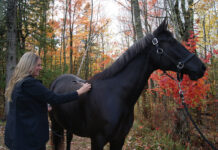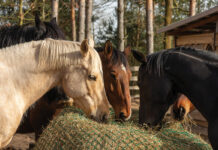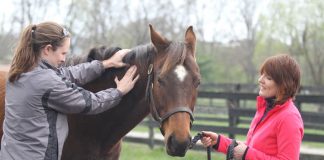
A vet prepares vaccines for a horse’s annual spring shots.
Q: With my dog and cat, vaccination schedules are becoming more spread out as research shows that they are still protected with an initial kitten/puppy series well into their middle years. Many small animal vets are going to three or even five-year schedules. Why aren’t equine vets doing the same thing?
Research in Horses
There is no knowledge to date as to what constitutes a protective antibody level against individual equine diseases. In a nutshell, testing antibody levels does not give any concrete information about disease protection past the manufacturer’s recommendation for any given vaccine. The gold standard for determining whether or not protective antibody levels are developed in the horse relies on vaccine challenge studies. This means a horse that has been inoculated against a specific disease is infected with that pathogen; the horse is then monitored to see if he develops the disease.
However, testing an appropriate number of individual horses for protective antibodies at longer intervals—for example, out to two years—is extremely expensive and has not really been done. In addition, testing for protection beyond a year for a disease like rabies is not only expensive but it is also dangerous to the research personnel and fatal to the horses. In general, equine vaccine protection is relatively short-lived.
Individual Vaccines
The United States Department of Agriculture (USDA) recommends that Eastern and Western encephalitis and tetanus vaccines should be given annually. Tetanus is widespread in the environment, with horses in constant contact with these bacteria. Because it’s difficult to control mosquitoes, recommendations to protect against the viruses they transmit (Eastern and Western encephalitis, West Nile virus) encourage annual vaccination at least a month in advance of insect season.
Influenza virus is known to undergo significant mutations within the virus that allow it to escape the horse’s immune system; for that reason, equine influenza vaccine is recommended every six months. (This is also the reason why human influenza vaccine is recommended annually in advance of flu season.)
The objectives for a vaccine like equine herpes virus (EHV, or rhinopneumonitis) are to protect the individual and to also limit the degree of shedding by members in a herd. Most horses have been exposed to the equine herpes virus by the time they are weaned, and this virus persists silently in the body until a horse is stressed or immune-compromised. Because it’s difficult for a horse to develop a good immune response to herpes virus beyond four to five months, this vaccine should be given two to three times per year for adequate protection.
The older backyard horse that doesn’t venture off the property (and isn’t living with horses that do) may need less rigorous vaccination schedules against respiratory illness, with just once a year being sufficient.
Not Worth the Risk
Finally, it’s important to consider just what might happen if you allow your horse’s vaccinations to lapse and he contracts a devastating disease. The cost of treatment is profoundly more expensive than the cost of administering vaccines. The intent with vaccination is to prevent a horse from incurring this degree of pain and suffering.
The core vaccines—Eastern and Western encephalitis, West Nile virus, tetanus, and rabies—should always be given annually to keep your horse as strongly immunized as possible against these potentially fatal diseases. All the mentioned equine vaccines are very safe when administered per the manufacturer’s recommendations.
NANCY S. LOVING, DVM, is a performance horse veterinarian based in Boulder, Colo., and is the author of All Horse Systems Go.
This article originally appeared in the June 2015 issue of Horse Illustrated magazine. Click here to subscribe!





